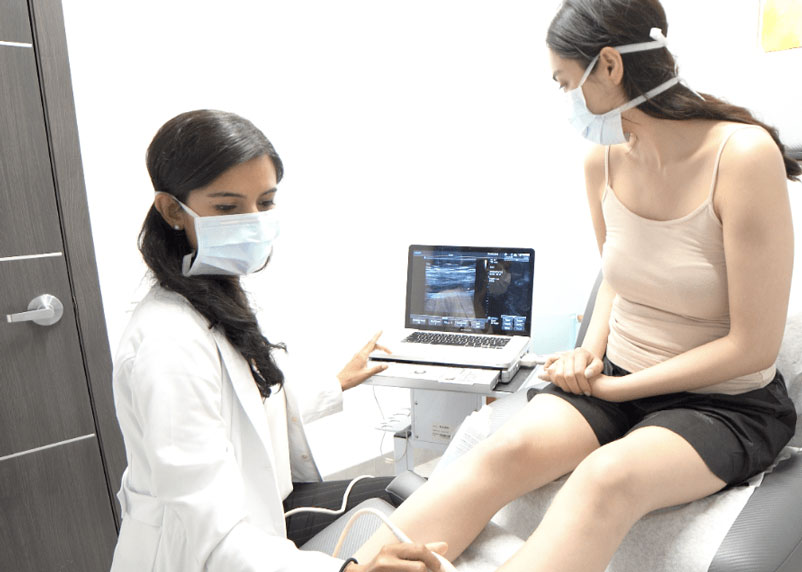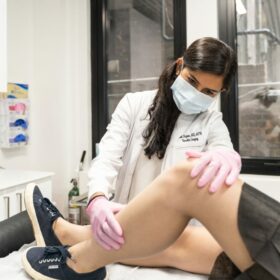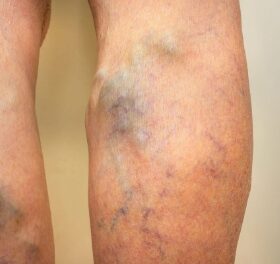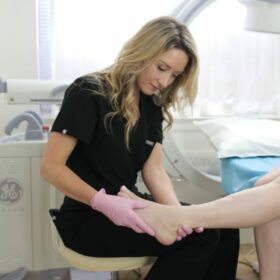Varicose veins are enlarged and twisted blood vessels that typically appear on the legs and feet. They are often caused by weakened valves in the veins, which lead to blood pooling in the legs. Varicose veins are a common condition that affects millions of people worldwide. Although they are often seen as a cosmetic issue, they can also cause discomfort, pain, and even health complications if left untreated.
At Vein Treatment Clinic, we specialize in minimally invasive vein treatments, including sclerotherapy, to effectively treat varicose veins. Patients often ask us if varicose veins can come back after treatment. In this article, we will explore the risk factors and chances of developing recurrent varicose veins after sclerotherapy.
Understanding Sclerotherapy Treatment for Varicose Veins
Sclerotherapy is a minimally invasive treatment for varicose veins that has been used for several decades with great success. The treatment involves injecting a sclerosant solution into the affected vein, which irritates the lining of the vein, causing it to swell and stick together. The sclerosant solution induces a chemical reaction that results in the walls of the treated vein collapsing, and the body reabsorbing it over time. The blood flow is then redirected to the healthy veins, restoring normal blood circulation in the leg.
Sclerotherapy is considered a highly effective and safe treatment for varicose veins, with a success rate of up to 90%. It is a minimally invasive procedure, meaning that it does not require anesthesia, and patients can return to their normal activities shortly after the procedure. However, as with any medical treatment, there are potential risks and side effects that should be discussed with your vein specialist before undergoing sclerotherapy.
Risk Factors for Recurrent Varicose Veins
While sclerotherapy is an effective treatment for varicose veins, there is always a risk that the veins may come back. Some of the risk factors for recurrent varicose veins include:
- Family History: Genetics play a significant role in the development of varicose veins. If one or both of your parents have varicose veins, you are more likely to develop them as well.
- Age: The risk of developing varicose veins increases as you get older. The valves in your veins weaken over time, making it more likely for blood to pool in the veins.
- Gender: Women are more likely than men to develop varicose veins. Hormonal changes during pregnancy and menopause can also increase the risk.
- Obesity: Being overweight or obese puts additional pressure on your veins, making it harder for blood to flow properly.
- Standing or Sitting for Long Periods: If you have a job that requires you to stand or sit for long periods, you are more likely to develop varicose veins.
Can Varicose Veins Come Back After Sclerotherapy?
While sclerotherapy is a highly effective treatment for varicose veins, there is always a chance that the veins may come back. The chances of recurrence depend on a variety of factors, including the severity of the varicose veins, the patient’s risk factors, and the type of sclerosant used during treatment.
In general, the chances of varicose veins coming back after sclerotherapy are low. According to studies, the recurrence rate for varicose veins treated with sclerotherapy is only 8.7%. This means that more than 90% of patients remain free of varicose veins after treatment.
However, it is important to note that there is no cure for varicose veins. Even after successful treatment, new varicose veins may form in other parts of the leg over time. This is why it is important to maintain a healthy lifestyle, including regular exercise and weight management, to reduce the risk of developing new varicose veins.
Other Treatment Options for Varicose Veins
If varicose veins do recur after sclerotherapy, there are other minimally invasive and surgical procedures that can be used to treat them. Endovenous laser ablation, radiofrequency ablation, and VenaSeal are all minimally invasive procedures that use heat or adhesive to close off the affected vein. Ambulatory phlebectomy is a surgical procedure that involves removing the affected vein through small incisions in the skin. These treatments are highly effective and safe, with minimal downtime and discomfort.
Preventing Varicose Veins from Forming or Recurring
While there is no guaranteed way to prevent varicose veins from forming or recurring, there are several lifestyle changes you can make to reduce your risk. These include:
- Regular Exercise: Exercise helps improve circulation and strengthens the muscles in your legs, reducing the risk of varicose veins.
- Weight Management: Maintaining a healthy weight reduces the pressure on your veins, making it easier for blood to flow properly.
- Compression Stockings: Wearing compression stockings can help improve circulation and reduce swelling in the legs.
- Avoiding Prolonged Sitting or Standing: If you have a job that requires you to sit or stand for long periods, take frequent breaks and stretch your legs.
- Elevating Your Legs: Elevating your legs above heart level for 15-20 minutes several times a day can help improve circulation and reduce swelling.
Choosing the Right Vein Specialist
Selecting the right vein specialist is critical to achieving successful treatment and prevention of varicose veins. Our team of board-certified vein doctors at Vein Treatment Clinic specializes in the latest minimally invasive vein treatments to effectively address varicose veins. Before creating a personalized treatment plan, we conduct comprehensive diagnostic tests using state-of-the-art vascular imaging and duplex ultrasound to identify the root cause of spider veins and varicose veins. Additionally, we offer hassle-free insurance verification to our patients even before their initial appointment, providing peace of mind throughout the treatment process.
Our vein clinics are equipped with modern facilities and are conveniently located throughout the United States, including New York, New Jersey, Long Island, California, and Washington DC. Schedule a consultation with us today to take the first step towards healthy and beautiful legs. Our vein specialists are dedicated to providing individualized care and helping you achieve optimal vein health.











